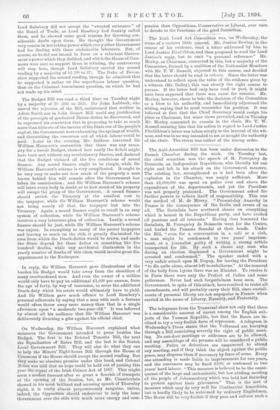The Budget Bill was read a third time on Tuesday
night by a majority of 20 (283 to 203). Sir John Lubbock, who
moved the rejection of the Bill, maintained that neither in Adam Smith nor in John Stuart Mill could any justification of the principle of graduated Estate-duties be discovered, and
he expressed his conviction that in proposing to take so much more than hitherto of the income of the State out of the people's capital, the Government were exhausting the springs of wealth,
and diminishing the resources out of which labour could be paid. Later in the evening, Mr. Balfour traversed Sir William Harcourt's contention that there was any neces- sity for a heroic Budget, showed bow easily the deficit might have been met without any revolutionary finance, and declared that the Budget violated all the five conditions of sound finance. Any sound finance ought to be simple, while Sir William Harcourt's scheme is very complicated. It ought to be very easy to make out how much of the property a man leaves behind him will remain after the Government has taken its contribution ; and Sir William Harcourt's scheme will leave every body in doubt as to how much of his property will escape the grasp of the Government, A. sound finance should enrich the Treasury at the smallest cost to the taxpayer, while Sir William Harcourt's scheme would not bring nearly all that the taxpayer lost into the Treasury. Again, a sound finance ought to result in an easy system of collection, while Sir William Harcourt's scheme involves a very laborious plan of collection. Lastly, a sound finance should be just, while Sir William Harcourt's scheme was unjust. In exempting so many of the poorer taxpayers and leaving so much on the rich, it greatly diminished the area from which the Death-duties would be drawn, and made the State depend for those duties on something like five hundred deaths, while any accidental diminution in the yearly number of deaths of this class, would involve great dis- appointment to the Exchequer.

































 Previous page
Previous page